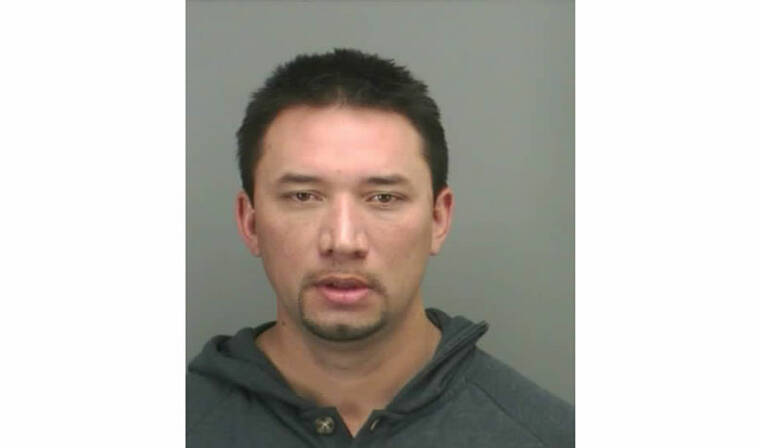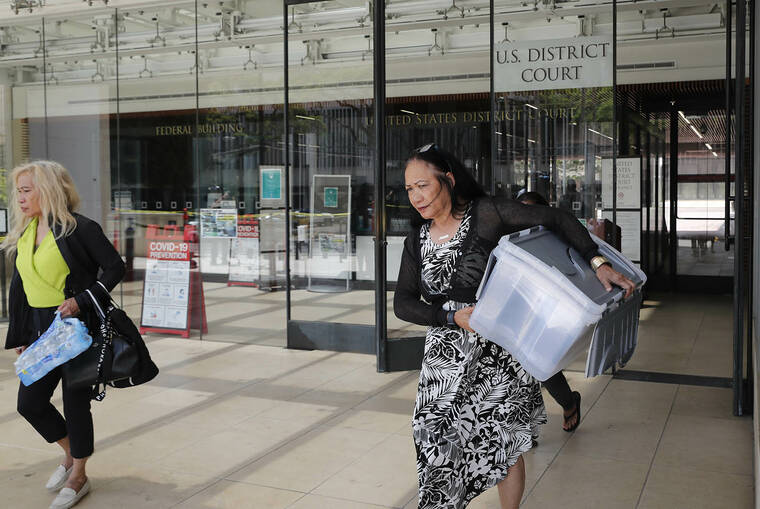Honolulu crime boss Michael Miske must forfeit millions in assets

COURTESY HPD
Michael Miske Jr.

JAMM AQUINO / JAQUINO@STARADVERTISER.COM
Assistant U.S. Attorney Ken Sorenson exits the federal building today.

JAMM AQUINO / JAQUINO@STARADVERTISER.COM
Maydeen Lau Miske, right, mother of Michael Miske Jr., leaves the federal building today.



The jury that found Michael Miske Jr. guilty of racketeering conspiracy, murder, and 11 other felony charges today determined that he must forfeit a range of assets, including property, a Boston Whaler, Ferrari, and more than $3.6 million.
Assistant U.S. Attorney Ken Sorenson estimated the value of all the assets at around $20 million to $28 million, which he said is the biggest individual forfeiture case in Hawaii.
On Thursday in Chief U.S. District Judge Derrick K. Watson’s court, the jury found Miske guilty in federal court of 13 out of 16 criminal counts.
This week they determined that as a result of the conviction of racketeering conspiracy, Miske must forfeit two pieces of real property and $611,123.60 in proceeds from the sale of real property, a Boston Whaler vessel, a fishing vessel, a 2017 Ferrari, $2,521,784.32 in cash from various financial institution accounts, and a cashier’s check for $1,162,826.76.
Miske’s sentencing is scheduled for Nov. 26.
Jurors convicted Miske after hearing evidence from federal prosecutors that Miske and other codefendants ran the “Miske Enterprise,” whose activities included murder, kidnapping, and robbery.
Don't miss out on what's happening!
Stay in touch with breaking news, as it happens, conveniently in your email inbox. It's FREE!
It also included acts relating to murder-for-hire, chemical weapons, interference with commerce through robbery and extortion, wire fraud, fraud in connection with identification documents, financial institution fraud, the Currency and Foreign Transactions Reporting Act, and obstruction of justice, the U.S. Department of Justice said in a press release.
Assistant U.S. Attorneys Mark Inciong, Michel Nammar, KeAupuni Akina, and Aislinn Affinito prosecuted the case and presented it in court.
Agencies involved in bring Miske to trial were the Federal Bureau of Investigation, the Internal Revenue Service Criminal Investigation, Homeland Security Investigations, the Criminal Investigation Division of the Environmental Protection Agency, and the Bureau of Alcohol, Tobacco, Firearms, and Explosives, with assistance from the Honolulu Police Department, the Drug Enforcement Administration, the Coast Guard Investigative Service, the United States Marshals Service Fugitive Task Force, the Cybercrime Lab of the Department of Justice Criminal Division Computer Crime and Intellectual Property Section, the Hawaii Criminal Justice Data Center, the Honolulu Fire Department, the Hawaii National Guard, 93rd Civil Support Team, the Office of Investigations–Office of the Inspector General for the Social Security Administration, and the Department of Justice Office of the Inspector General.



